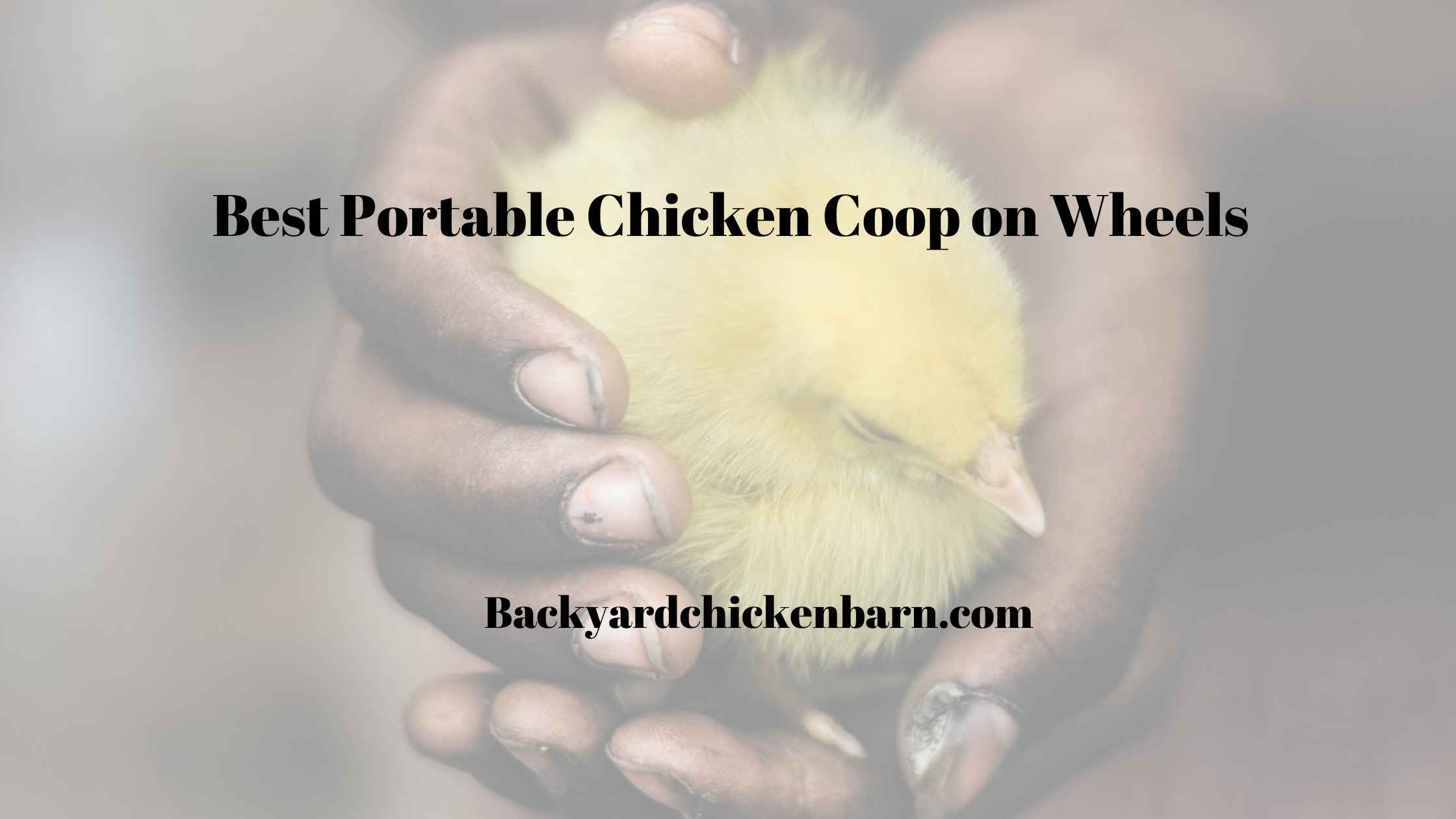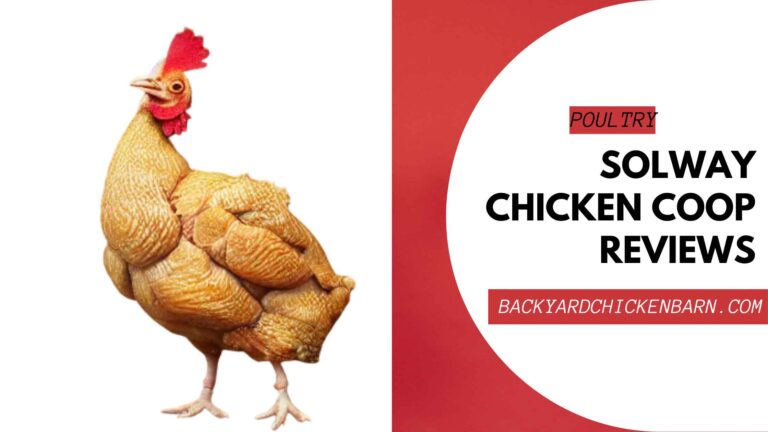The Best Portable Chicken Coop on Wheels
A portable chicken coop on wheels, often referred to as a chicken tractor, provides numerous benefits for both the backyard poultry keeper and the birds.
It allows chickens to have fresh ground regularly, helps in natural pest control, and reduces feed costs as birds can forage for a significant portion of their diet.
For poultry enthusiasts considering a mobile solution, here is a comprehensive guide to the best portable chicken coops on wheels.
Features to Consider:
- Size & Capacity: Ensure the coop accommodates your flock size. For instance, a 4×8 foot coop can typically house 8-10 chickens.
- Sturdiness: Look for coops made with quality materials to withstand different weather conditions.
- Predator Protection: Ensure it includes latches, reinforced mesh wire, and other features to keep predators at bay.
- Easy Access: For cleaning, egg collection, and feeding, having doors and hatches at convenient heights and locations is vital.
- Ventilation: Good airflow is crucial for the health and comfort of the birds.
- Shade & Shelter: Ensure there’s adequate shade for chickens to take refuge from the sun or rain.
Click to Shop Portable Chicken Coops on Amazon (Our Recommendations)
Top Portable Chicken Coops on Wheels:
- The Movable Hen House
- Features: A robust wooden structure, spacious nesting boxes, roosting bars, and a built-in run.
- Benefits: Easy to move, offers plenty of space for chickens, and has an efficient layout.
- The Compact Coop Cruiser
- Features: Sleek metal frame, compact design suitable for urban settings, and a slide-out tray for easy cleaning.
- Benefits: Space-saving, lightweight, and ideal for small flocks.
- The All-Weather Roost
- Features: Weather-resistant materials, insulated walls, and a protected run area.
- Benefits: Great for areas with extreme weather conditions and provides all-year-round protection.
- The Farmhouse Feathered Friend Mobile
- Features: A rustic design resembling a miniature barn, spacious interiors, and easy access points.
- Benefits: High aesthetic appeal, practical design, and ample space.
- The Eco-Friendly Tractor
- Features: Made with sustainable materials, a modular design, and incorporates a rainwater collection system.
- Benefits: Environmentally friendly, customizable, and innovative design.
Advantages of Using a Portable Coop:
- Natural Foraging: As you move the coop, chickens get access to fresh patches of grass and insects, reducing feed costs.
- Pest Control: Chickens naturally hunt pests like ticks, reducing the need for chemical controls.
- Fertilization: As chickens forage, they also fertilize the ground with their droppings.
- Flexibility: You can move the coop to various locations depending on the season or to manage the land better.
Conclusion:
Investing in a portable chicken coop on wheels can be a game-changer for both small-scale and large-scale poultry enthusiasts. It’s crucial to consider the specific needs of your flock and land before making a decision.
Remember, the best coop is one that ensures the safety, health, and happiness of your feathered friends.
ALSO SEE: Lesbian Ducks

FAQ: Portable Chicken Coop on Wheels
- What is a portable chicken coop on wheels?
- A portable chicken coop on wheels, commonly referred to as a chicken tractor, is a movable chicken house that allows poultry to be rotated on different pasture areas.
- Why use a chicken coop on wheels?
- It allows chickens to access fresh ground regularly, aids in natural pest control, and can reduce feed costs.
- How many chickens can fit in a portable coop?
- It varies by design, but a standard 4×8 foot coop can generally house 8-10 chickens.
- Are portable coops safe from predators?
- If well-designed with reinforced mesh wire, secure latches, and other predator-proof features, they can be safe.
- How often should I move the coop?
- Ideally, every 1-2 days, or once the ground in the current location shows signs of wear and the vegetation is mostly consumed.
- Do portable coops provide shelter from rain and sun?
- Yes, most designs incorporate shaded areas or shelters to protect from weather elements.
- How do I clean a mobile chicken coop?
- Many designs have removable trays or floors, and because they’re on fresh ground regularly, there’s less accumulation of waste.
- Are there any disadvantages to mobile coops?
- They might not be as sturdy as stationary coops, and in extreme weather, additional protection might be needed.
- Do they come with nesting boxes?
- Yes, most portable coops come with nesting boxes for egg-laying.
- Can I build my own portable coop?
- Absolutely! There are many DIY plans available online.
- Is it hard to move the coop?
- With wheels and a well-balanced design, they’re generally easy for one or two people to move.
- Do I need a special permit for a mobile coop?
- Local regulations vary. It’s always best to check with local authorities.
- How do chickens adjust to moving regularly?
- Chickens typically adjust well, especially as they get fresh areas to forage.
- Do portable coops work in winter?
- They can, but additional insulation and protection might be needed in colder climates.
- Are they suitable for urban settings?
- Yes, especially smaller designs, which can be great for city dwellers with limited space.
- How much do portable chicken coops cost?
- Prices vary based on size, material, and features, ranging from $100 to over $1000.
- Can I attach an external run to my mobile coop?
- Many coops come with integrated runs, but you can often add an external one if needed.
- What materials are they typically made from?
- Wood, metal, and high-quality plastic or composite materials.
- Do wheels affect the stability of the coop?
- Not if designed well. The wheels are usually lockable to keep the coop in place.
- How do I protect my flock from aerial predators?
- Some designs come with covered tops, or you can add bird netting.
- Are mobile coops suitable for other poultry like ducks?
- Yes, but ensure the design meets the specific needs of the bird type.
- Do these coops have roosting bars?
- Most do, as roosting is a natural behavior for chickens.
- How do I ensure good ventilation in the coop?
- Look for designs with vents or mesh areas that allow airflow.
- Can I customize my portable coop?
- Many people add additional features or paint their coops for a personalized touch.
- Is it easy to assemble a purchased mobile chicken coop?
- Most come with assembly instructions, and while some are easier than others, general DIY skills are usually sufficient.
- Can I use a portable coop for chicks?
- If the coop provides adequate protection and warmth, it can be used for chicks.
- Do I need to provide additional feed or water systems?
- Yes, ensure your chickens have constant access to food and fresh water.
- Do coops on wheels damage the lawn?
- Moving the coop regularly minimizes damage, and chicken droppings can actually fertilize the area.
- How long do portable chicken coops last?
- With proper maintenance, they can last several years.
- Can I integrate automatic doors or systems?
- Yes, some poultry keepers add automatic doors or watering systems.
- Is it harder to collect eggs from a mobile coop?
- Not if designed with accessible nesting boxes.
- Do chickens get motion sickness when the coop is moved?
- No, short moves don’t distress the chickens.
- How do I anchor the coop in windy conditions?
- Some designs have stakes or anchors for added stability.
- Can I add solar panels to my coop?
- Yes, many add solar panels for lighting or automated systems.
- Do wheels work on uneven terrain?
- Larger wheels or designs with adjustable axles are better for uneven ground.
- How do I protect my coop from rust or decay?
- Regular maintenance, using rust-proof materials, or applying protective coatings can help.
- Can I use a mobile coop in a stationary way?
- Yes, just lock the wheels and keep it in a fixed location.
- How do I introduce chickens to a new portable coop?
- Place them inside and give them time to acclimate, ensuring food and water are available.
- Do I need a backup stationary coop?
- Some keepers have both for flexibility, but it’s not necessary.
- Can I use a portable coop for breeding?
- Yes, as long as it provides a safe and comfortable environment for the hen and her chicks.



